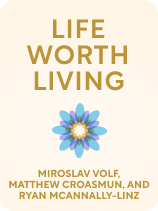

This article is an excerpt from the Shortform book guide to "Life Worth Living" by Miroslav Volf, Matthew Croasmun, and Ryan McAnnally-Linz. Shortform has the world's best summaries and analyses of books you should be reading.
Like this article? Sign up for a free trial here.
What does it mean to live well? How should we approach life? How should we think about death?
The authors of Life Worth Living: A Guide to What Matters Most don’t claim to have the answers, but they offer some possible answers based on the life philosophies of several great thinkers. Even if you disagree with their ideas, you can use them as a springboard for figuring out what you believe.
Continue reading for an overview of this book that will get you thinking about what truly matters in life and how to translate those beliefs into action.
Overview of Life Worth Living: A Guide to What Matters Most
Published in 2023, Life Worth Living: A Guide to What Matters Most summarizes a class the authors offer every year at Yale University. The authors—Miroslav Volf, Matthew Croasmun, and Ryan McAnnally-Linz—are Christian theologians, but they introduce concepts from many religious (and non-religious) traditions and challenge students—who now include you—to make up their own minds about what it means to live well.
We’ll explain what a life philosophy is and why you should have one. Then, we’ll discuss how you can use contemplation to formulate your own life philosophy, and we’ll consider the four key aspects your life philosophy should cover: existential, emotional, material, and moral welfare. Finally, we’ll explore how you can put your life philosophy into practice.
The Value of a Life Philosophy
Before we jump into the diverse life philosophies that the authors present, let’s establish some fundamentals: First, we’ll define the notion of a life philosophy. Then, we’ll explain why you should have a life philosophy by exploring the value it can bring to your life.
What Is a Life Philosophy?
Volf, Croasmun, and McAnnally-Linz argue that your life philosophy encompasses all of your beliefs about what it means to live well (for example, your beliefs about which morals are worth adhering to and the existential reasons for life on earth). Life philosophies are often inspired by transformative experiences like the loss of a loved one or exposure to radical ideas, which prompt you to discover your most authentic values and ideals through contemplation. But your life philosophy is never permanent—you can think of it like a living document that outlines your vision of what it means to live well, which should be updated as you learn and grow throughout life.
Why You Should Have a Life Philosophy
According to Volf, Croasmun, and McAnnally-Linz, many people live unintentionally; instead of thinking deeply about the best way to live, they act on their first instincts and assume they’re making the right choices. In the US, these instincts are informed by a common-sense vision of what it means to live well—a vision of a life that’s “happy, healthy, and long.”
The authors explain that there are three reasons to doubt this cookie-cutter life philosophy, stop living unintentionally, and come up with your own life philosophy. First, many admirable people—people we generally believe to have lived well—don’t achieve health, happiness, or longevity. For example, the physicist Albert Einstein struggled with chronic illness, Mother Teresa struggled with depression, and President John F. Kennedy died at the age of 46. Nevertheless, most people would agree that they lived well. This suggests that living well requires more than just those three qualities.
Second, you’re accountable for living well. You might already believe that you’re accountable to yourself or to others. The authors say you’re also accountable to some kind of moral authority, whoever that may be—Confucianists, for example, believe you’re accountable to your ancestors since they gave you life, and Muslims believe you’re accountable to God because before you were born, you promised to obey him. The authors argue that this accountability makes life meaningful. Without it, you’d just be following your desires—and even if your desires were objectively good, you’d lack a sense of accomplishing something worthwhile.
Third, life philosophies promote your overall welfare by helping you align your actions with your ideals. The authors explain that once you have a vision of what it means to live well, you naturally desire to work toward emulating that standard. Therefore, your life philosophy compels you to make thoughtful choices based on deeply personal, hard-won beliefs. Since these choices will be more meaningful to you, you’ll be less likely to regret them—and in sum, they’ll make you happier with your life as a whole.
How to Define Your Life Philosophy
Now that you know why you should have a life philosophy, let’s explore how you can define your own. We’ll explain how contemplation can help you integrate your beliefs into a coherent life philosophy. Then, we’ll describe the four key components of a good life philosophy and share some perspectives from various life philosophies to inspire your thinking.
Contemplation Leads to Integration
Since Volf, Croasmun, and McAnnally-Linz believe that your life will feel more meaningful if you have a life philosophy that resonates with you, they argue that you should contemplate your life philosophy. They explain that this can be a complicated process—not just because there are so many ideas to sift through, but also because it can be hard to make them all fit together. For example, say you have two potentially conflicting beliefs about what it means to live well: It’s important to proudly be yourself in public, but it’s also important to avoid going to prison. You might have a hard time reconciling these beliefs if, for example, you’re an LGBT person living in a region that criminalizes LGBT activity.
For this reason, the authors recommend that you think carefully about how to weigh each aspect of your life philosophy.
They explain that you’re probably not going to get everything to line up perfectly—life is complicated, with a lot of considerations to juggle. They also recommend that you stay open to new wisdom; that way, you can revise your life philosophy if you update your thinking about something.
Finally, Volf, Croasmun, and McAnnally-Linz recommend that you devote time to pondering your life philosophy regularly—perhaps even daily. They explain that setting time aside to think about your life philosophy helps you remember it. There’s no instruction manual for life that you can stop to consult before you make decisions, but if you keep your life philosophy top of mind by intentionally contemplating it often, you’ll be more likely to live well—however you define that.
The Four Key Aspects of Your Life Philosophy
As you contemplate your life philosophy, the authors recommend that you focus on four key aspects of life, each an essential component of a well-rounded life philosophy: your existential, emotional, material, and moral welfare. We’ll describe each aspect in more detail now. We’ll also include some perspectives on each aspect from various life philosophies the authors describe—you can use these as a springboard to jump-start your contemplation or even adopt the perspectives that resonate with you.
Existential Welfare
First, the authors argue that all life philosophies include existential beliefs about what it means to live well (for example, Wiccans believe living well means living in congruence with nature). Since life philosophies also motivate action, a good life philosophy promotes existential welfare—it inspires you to take actions that make you feel good about your existence given your beliefs about the purpose and significance of life on Earth. For example, Wiccans partake in seasonal rituals to honor and reinforce their connection with nature.
The authors note that your life philosophy can promote your existential welfare even if it’s not based in traditional religious beliefs. For example, the authors explain that some atheist scientists incorporate unity in their life philosophies because they believe it furthers human evolution, since humans who work together are more likely to survive and thrive.
To illustrate how your life philosophy can promote your existential welfare, the authors cite Robin Wall Kimmerer. In Braiding Sweetgrass, she writes thatsome Native American religions hold that human life depends on symbiotic relationships with other lifeforms—for example, we eat plants, and in return, we help plants grow. In accordance with those beliefs, Native American life philosophies promote existential welfare by encouraging you to form respectful, mutually giving relationships with the land you live on and the other lifeforms who live there with you: The idea is that to live well, you have to help others live well, too.
Emotional Welfare
A good life philosophy also promotes emotional welfare. Volf, Croasmun, and McAnnally-Linz explain that for most people, long-term happiness is an integral part of what it means to live well. If that’s true for you, it makes sense to adopt a life philosophy that factors sustainable happiness into the equation, like utilitarianism. Utilitarianism is a school of thought that argues that pleasure and things that increase pleasure are worthwhile, while pain and things that increase pain are not. All pleasures are equally valuable in this view—it doesn’t matter whether you enjoy playing video games or trying to cure cancer; so long as you’re increasing net pleasure and decreasing net pain, you’re doing something good.
However, the authors explain that according to some thinkers, utilitarians might be wrong—there may be some value to feeling unhappy at least some of the time. For example, Buddhists believe that all attachments (like the desire for happiness) lead to suffering, so instead, they pursue enlightenment—placid acceptance of reality. Additionally, when the writer Oscar Wilde was imprisoned for sodomy, he learned the value of unhappiness: It’s an unavoidable part of life, and you have to experience it to really understand it. Therefore, being unhappy deepens your knowledge of what life’s all about. If you agree that unhappy emotions are an important part of life, your life philosophy should reflect that—happiness shouldn’t be your only goal.
Material Welfare
A third component of a good life philosophy is that it promotes material welfare. The authors explain that different thinkers have different standards of material welfare. According to the Greek philosopher Aristotle, material welfare means having access to the resources that enable you to behave morally (you might resort to stealing if you can’t afford to eat, for example) and live comfortably (for example, beauty products might help you enjoy life more). In contrast, Buddhists define material welfare as meeting your minimum survival needs (like food and shelter) and relational needs (like proximity to spiritual teachers). If you have more than that, you might form attachments that hinder enlightenment.
Volf, Croasmun, and McAnnally-Linz also say that your life philosophy should help you understand whose material welfare you’re concerned with. They explain that the German philosopher Friedrich Nietzsche prioritized the flourishing of brilliant people above all else because their work improves the quality of life on Earth. For brilliant people to flourish, they need superior living conditions, which a deprived underclass must work hard (and suffer more) to provide them with. However, many other philosophies advocate different visions of global material welfare. For example, Christians believe God’s love can heal the entire world and bring about universal flourishing.
Moral Welfare
Finally, Volf, Croasmun, and McAnnally-Linz argue that a good life philosophy promotes moral welfare—the sense that you’re generally a virtuous person—by defining right and wrong behaviors. The authors explain that many people believe they’ll be virtuous if they minimize the harm they do to others, but this doesn’t pass muster because sometimes, you must harm others in order to do the right thing. To illustrate, the authors cite the spiritual war depicted in a Hindu text called The Bhagavad Gita. In this scripture, the god Krishna advises a man named Arjuna that he must harm his family to win the war for righteousness and against sin.
If you agree that moral welfare could sometimes demand harming others, your life philosophy might require a different behavioral standard than minimizing harm. One alternative is to judge your actions by their outcomes. The authors explain that utilitarians, for example, don’t care what you do so long as your actions promote pleasure and decrease pain. One problem with this approach is that the repercussions of your actions are often unpredictable. For example, if you’re not aware that some coffees are produced by forced laborers, you can’t predict that your purchase of that coffee might fuel the modern slave trade.
The authors say other thinkers are more concerned with the quality of your actions themselves. For example, the authors say that Jews, Christians, and Muslims believe the only way to act rightly is to obey God (whose will you can determine with the help of your spiritual community). Confucianists, on the other hand, believe that to act rightly is to promote a healthy society, which begins with healthy interpersonal relationships. Therefore, they emphasize treating people well.
Another facet of moral welfare is who you should act rightly toward. The authors describe four answers to this question: First, the philosopher Charles Taylor says you are your highest priority, since you’re an individual, and you have a duty to fulfill your unique potential. In contrast, the utilitarian Peter Singer argues that since everyone’s pleasure is equally important, you should act rightly toward everyone, even perfect strangers. In practice, this could mean donating to poor people in other countries. Somewhat similarly, Christians believe you should act rightly with anyone you encounter, including strangers and people who are different from you. Finally, Confucianists believe that your family comes first but you should treat others well, too.
How to Put Your Life Philosophy Into Practice
We’ve talked about how to come up with a good life philosophy; now, let’s talk about how to put one into practice. We’ll discuss four practical applications of your life philosophy: how your beliefs about death can motivate you to live well, how to translate your values into actions, how to recover when you make mistakes, and finally, how to cope with hardship.
How to Get Motivated: Use Death
According to the authors, your beliefs about death can motivate you to act in certain ways while you’re still alive. The authors describe four views of death: two that characterize death positively, one that characterizes death negatively, and one that characterizes death neutrally. Let’s explore those philosophies and their impacts on your actions.
Plato and Hägglund: Death Is Good
According to the ancient Greek philosopher Plato, death is good because it separates your everlasting soul from your ephemeral body. Plato believed the soul is superior to the body because it’s your true identity and can be improved. Your body, on the other hand, is fundamentally worthless, and it can even degrade your soul by distracting you from the pursuit of wisdom. The authors explain that if you believe, like Plato, that your soul lives on forever, you’ll be motivated to do two things: You’ll spend your life improving your soul for the afterlife, and you’ll approach death with a positive outlook.
The modern philosopher Martin Hägglund likewise argues that death is good because it makes life more meaningful. The authors explain that Hägglund believes we can only truly care about things that have the potential to end. If we knew life would last forever, we wouldn’t take pains to nurture, preserve, or enhance it (actions that amount to care). If you agree with Hägglund, death can motivate you to act now and make the most of the present.
The Apostle Paul: Death Is Bad
The Christian apostle Paul believed that death is bad because eternal life is God’s will. Volf, Croasmun, and McAnnally-Linz explain that Paul believed God intended to make humans immortal, but we lost that privilege because we sinned and became mortal instead. Since death is a punishment, it’s natural to feel sad, frightened, and negative about it. However, according to the Christian faith, believers can overcome physical death. Just as God resurrected Jesus after he was crucified, he gives believers the gift of a second chance at life by resurrecting their bodies after death. According to Paul, this means that death can motivate you to live well by pursuing eternal life through Christian belief, which leads to resurrection.
Thich Nhat Hanh: Death Is Neutral
Volf, Croasmun, and McAnnally-Linz state that Buddhists believe your sense of self is an illusion; you’re not a permanent personality, but a dynamic process that’s forever unfolding. This applies to Buddhist beliefs about death, too—death is just a part of the process, and it’s no more meaningful or final than any other part since you continue to transform afterward. According to the Buddhist thinker Thich Nhat Hanh, viewing death as a neutral change in your state of being motivates you to do two things: First, you’ll embrace death instead of dreading it. Second, since all fear is connected to your fear of death (for example, perhaps you fear spiders because they could be venomous), you’ll let go of other fears you have and enjoy life more.
How to Translate Your Values Into Action
The authors explain that when you glean a new piece of your life philosophy, it’s important to translate your newfound values into action. This might require making changes to your life or even to yourself, which can be an intimidating prospect. Let’s discuss four methods for getting started on such lifestyle changes and how to sustain those changes over time.
Getting Started
The authors explain that you may have some cognitive dissonance about making lifestyle changes based on your life philosophy: On one hand, you may know you need to change if you want to live well; on the other hand, you might be reluctant to change because your life is comfortable enough as is. If you feel this tension, the authors offer one possible resolution: the Christian concept of surrender. Volf, Croasmun, and McAnnally-Linz explain that Christians believe only Jesus can help you overcome reluctance to change. If you agree, you can start the process of change by admitting that you’re incapable of doing it alone, surrendering your soul to Jesus, and letting him guide you throughout life.
The authors also offer some strategies for those who are eager to make lifestyle changes. First, they recommend you use “nudges”—prompts that make it feel natural for you to practice a desirable habit—which economists Richard Thaler and Cass Sunstein describe in their book, Nudge. For example, you might keep a full water bottle next to you at all times if you want to drink more water. However, Volf, Croasmun, and McAnnally-Linz explain that nudges aren’t appropriate for every kind of change; for instance, you can’t nudge yourself into pursuing a more meaningful career.
Volf, Croasmun, and McAnnally-Linz cite two thinkers’ advice for making the kinds of changes that nudges can’t help you with. First, the Muslim philosopher Abu Hamid al-Ghazali advises self-scrutinizing: deciding how God wants you to behave, thinking before you act, and continually checking that you’re meeting God’s standards.
In contrast, say the authors, Oscar Wilde recommends following your heart and scrutinizing societyand its expectations of you—since you’re unique, you’re entitled to live uniquely, and it’s wrong of society to suppress your authentic identity. The authors say that according to Wilde, you can discover your authentic identity and fulfill your unique potential via creative self-expression.
Making It Sustainable
Volf, Croasmun, and McAnnally-Linz explain that, once you’ve started, you must sustain the lifestyle changes you’ve made in order to live well in the long term. They offer a few strategies from different philosophers for doing this. First, they recommend getting (or staying) involved in a community whose life philosophy is similar to yours. Such a community can continually remind you of what’s important and may have customs that help you put your life philosophy into practice regularly. The authors also note that according to Kimmerer (Braiding Sweetgrass), your community might not be limited to other humans—for example, if you value having a reciprocal relationship with the land, you might make a habit out of communing with nature.
Another strategy the authors recommend is meditation. They explain that, according to Buddhists, meditation gives you the opportunity to observe the true nature of existence: that everything is part of an endless, dynamic process. This knowledge enables you to gradually let go of your attachments (for example, you won’t begrudge death because you’re attached to life) and more easily see the connections between everything that exists. This process turns you into a more disciplined and empathetic person, which makes it easier to put your life philosophy into practice (assuming that you value discipline and empathy).
Finally, Volf, Croasmun, and McAnnally-Linz recommend prayer. They explain that Ignatius, who founded the Christian sect called Jesuits, came up with a daily prayer called the “examen.” Jesuits believe the examen helps you sustainably live out your values by making you more mindful of God’s constant influence in your life. To pray the examen, follow these steps: First, thank God for the parts of your day you appreciate. Next, reflect on the times you felt close to God today and the times you rejected him. Then, think about the day’s regrets and ask for forgiveness. Also, commit to repairing any harm you’ve done or that others have done to you. Finally, ask God to strengthen your relationship with him and help you get through tomorrow.
How to Recover When You Make Mistakes
No matter how hard you try to live well, you’re bound to make mistakes. You might not realize you’ve made a mistake until you witness a negative consequence of your actions. But, once you know you’ve made a mistake, say the authors, you must accept responsibility for it. (If you don’t, you’re more likely to repeat the mistake.) Then, you can try to do better in the future.
If you lack confidence in your ability to do better, the authors recommend setting bite-sized goals for yourself. Bite-sized goals are doable and realistic, so you’ll be more likely to succeed at them. As you aim for one bite-sized goal after the other, you’ll make gradual progress, which is better than trying (and failing) to leap toward an unreachable goal.
However, Volf, Croasmun, and McAnnally-Linz acknowledge that, sometimes, simply trying to do better in the future isn’t enough. This may be the case if you’ve harmed someone or believe you’ve offended God. In that case, you need to repair the harm you’ve done. One strategy for this is the Jewish practice of “repentance.” First, openly admit your mistake to the person you harmed, your community, and God. Second, try to mend what you’ve broken; for example, if you stole something, return the item and apologize. Third, change your behavior—if you truly regret your mistake, you won’t make it again.
Another strategy for repairing harm comes from the Buddhist thinker Pema Chӧdrӧn. First, allow yourself to feel remorseful. Volf, Croasmun, and McAnnally-Linz emphasize that this doesn’t mean shaming yourself; instead, it refers to a deep acceptance that what you’ve done is wrong. Second, be merciful to yourself by stopping the behavior, therefore ensuring you won’t have to face the negative consequences of this mistake again. Third, give yourself some loving attention in the form of meditation; this will make you strong enough to resist future temptations. Fourth, decide that you won’t ever make this mistake again.
How to Cope With Hardship
Volf, Croasmun, and McAnnally-Linz write that hardship is inevitable: At some point, everyone experiences sadness, discomfort, or even anguish. They explain that depending on your life philosophy, there may be two ways to cope with hardship—first, minimizing social harms and second, finding refuge in your beliefs. Let’s explore each.
Minimize Social Harms
Volf, Croasmun, and McAnnally-Linz explain that some thinkers believe you’re obligated to minimize social harms like war, poverty, and racism. One way you can minimize social harms is via “effective altruism,” a utilitarian movement centered around exercising extreme generosity to solve high-priority problems (for example, you might devote your spare time to the AI alignment problem—ensuring AI only benefits and never harms humanity). While this provides direct aid to people in hardship, it may not address the root cause of their suffering—social injustices. If your life philosophy includes working toward social justice, the authors describe three different approaches that may inspire you:
First, the 18th-century English writer Mary Wollstonecraft believed society malfunctions due to gender inequality. Therefore, we should work to give men and women equal educational, political, and economic opportunities. Second, the civil rights activist James Baldwin believed society malfunctions due to white supremacy, which he thought arose because white people felt they needed to dominate others to cope with life’s hardships. Therefore, white people must find healthier coping mechanisms. Finally, the authors say Confucius believed society malfunctions because its leaders aren’t living well. Therefore, we should educate leaders on what it means to live well; then, they can set up social programs that enable regular people to live well, too.
Find Refuge in Your Beliefs
No matter what we do to minimize social harms, hardship may be unavoidable—how should you deal with it? The authors explain that you can deal with hardship by finding refuge in your beliefs. For example, Muslims believe that God created everything that exists, including hardship. This means you should trust that hardship is ultimately a good thing, since it’s part of God’s righteous plan for the universe. Such trust in God can help you endure your anguish with patience and even be grateful for it. Similarly, Friedrich Nietzsche viewed hardship as a valuable part of life because it inspires you to be a better person. If you agree, you can find refuge in the belief that your hardship is helping you become the person who’ll enjoy what tomorrow brings.

———End of Preview———
Like what you just read? Read the rest of the world's best book summary and analysis of Miroslav Volf, Matthew Croasmun, and Ryan McAnnally-Linz's "Life Worth Living" at Shortform.
Here's what you'll find in our full Life Worth Living summary:
- What a life philosophy is and why you should have one
- The four key components of a good life philosophy
- Why contemplating death can motivate you to live more fully






